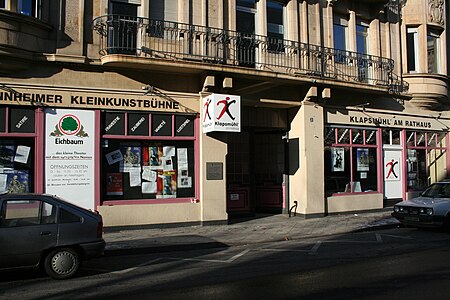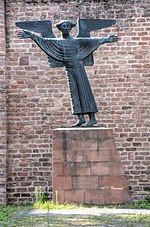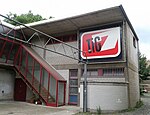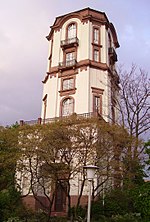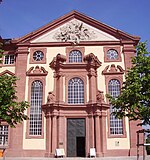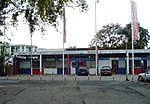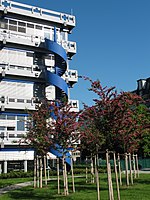Mannheim (German pronunciation: [ˈmanhaɪm] ; Palatine German: Mannem or Monnem), officially the University City of Mannheim (German: Universitätsstadt Mannheim), is the second-largest city in the German state of Baden-Württemberg, after the state capital of Stuttgart, and Germany's 21st-largest city, with a 2021 population of 311,831 inhabitants. The city is the cultural and economic centre of the Rhine-Neckar Metropolitan Region, Germany's seventh-largest metropolitan region with nearly 2.4 million inhabitants and over 900,000 employees.Mannheim is located at the confluence of the Rhine and the Neckar in the Kurpfalz (Electoral Palatinate) region of northwestern Baden-Württemberg. The city lies in the Upper Rhine Plain, Germany's warmest region. Together with Hamburg, Mannheim is the only German city bordering two other federal states. It forms a continuous conurbation of around 480,000 inhabitants with Ludwigshafen am Rhein in the neighbouring state of Rhineland-Palatinate, on the other side of the Rhine. Some northern suburbs of Mannheim belong to Hesse. Upstream along the Neckar lies Heidelberg, the fifth-largest city of Baden-Württemberg and the third-largest of the Rhine-Neckar Region.
Mannheim is unusual among German cities in that its city centre streets and avenues are laid out in a grid pattern, leading to the city's nickname Quadratestadt (Square City). Within a ring of avenues surrounding the city centre, there are squares, numbered from A1 to U6, instead of street names. At the southern base of that system is Mannheim Palace, one of the largest palace complexes in the world, and the second-largest in Baroque style after Versailles. It was the former home of the Prince-elector of the Electoral Palatinate, and now houses the University of Mannheim, which repeatedly receives top marks in business administration and is sometimes known as the "Harvard of Germany". The Mannheim May Market is the largest regional consumer exhibition of Germany. The civic symbol of Mannheim is the Romanesque Mannheim Water Tower, completed in 1886 and rising to 60 metres (200 feet) above the highest point of the art nouveau area Friedrichsplatz. Mannheim is well-known for its inventions, including the automobile, the bicycle, and the tractor, which is why the city is often called the "city of inventions". The city is the starting and finishing point of the Bertha Benz Memorial Route, which follows the tracks of the first long-distance automobile trip in history.
A Großstadt (major city with more than 100,000 inhabitants) since 1896, Mannheim is now an important industrial and commercial city, a university town, and a major transportation hub between Frankfurt and Stuttgart, including an ICE interchange (the Mannheim Hauptbahnhof), Germany's second-largest marshalling yard (the Mannheim Rangierbahnhof), and Germany's largest inland port (the Mannheim Harbour). The city is home to many factories, offices and headquarters of several major corporations such as Roche, ABB, IBM, Siemens, Unilever and more. Mannheim's SAP Arena is home to German ice hockey record champions Adler Mannheim as well as the popular handball team Rhein-Neckar Löwen. Since 2014, Mannheim has been a member of the UNESCO Creative Cities Network and holds the title of "UNESCO City of Music". In 2020, Mannheim was classified as a global city with 'Sufficiency' status by the Globalization and World Cities Research Network (GaWC). Mannheim is a smart city; the city's electrical grid is installed with a power-line communication network. The city's tourism slogan is "Leben im Quadrat" ("Life in the Square").
